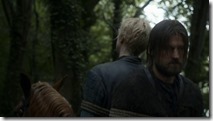 |
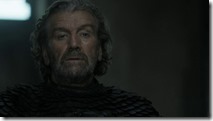 |
 |
“Walk of Punishment”
I really have no complaints about this episode of Game of Thrones, but it’s already started me on the always-entertaining process of trying to guess where HBO might choose to end the season. I think I have a pretty good idea, but it would entail the timeline of “1 book = 1 season” being diverted from more substantially than I expected this early. We’ll see if I’m right.
One character I haven’t talked about much this season is Theon Greyjoy. He was never a huge favorite of mine in the books but his plotline has become rather fascinating, because I have absolutely no idea what’s going to happen in it. We’re in completely uncharted territory regarding the entire “rescue” by the young man with no name (Iwan Rheon). In fact Theon was pretty much absent from the story during this point in the books, so he represents a complete wild-card. Even further North, a desperate Mormont turns once again to the vile Crastor for help, as Mance and Jon arrive at the Fist of the First Men to find many dead horses arranged in a spiral, but no dead men. The meaning could hardly be more clear, and Mance realizes that whatever happened to the Crows at that place, Mormont is at best severely weakened, and he sends Tormund to lay the groundwork for an attack on The Wall at Castle Black.
 |
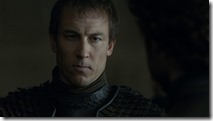 |
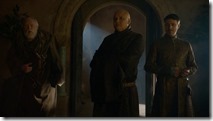 |
In the endless stream of character introductions, there were two more big ones this week – Edmure Tully (Tobias Menzies, in his second sighting of the day on this blog) and Brynden Tully (Clive Russell), known universally – much to the dismay of his late brother – as The Blackfish. Both are hugely important characters, and Blackfish especially is a memorable one – and Russell is the rare example of an actor who looks exactly like I imagined the character would look. With Cat’s father dead Edmure is the new Lord at Riverrun, and he’s already disappointed Robb greatly (showing his displeasure is his best scene in many an episode) by disregarding orders and rousting The Mountain and his men from a mill, while Robb wanted to lure them into Stark territory. I won’t see too much about these two characters and how they’ll slot into the story, but their introductions were spot-on – both projected the persona that they did in the books.
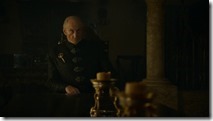 |
 |
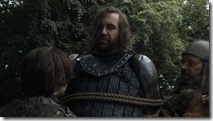 |
In King’s Landing, we finally got our first look of the season at the irreplaceable Varys – though it was a brief one – and Tyrion got the unwelcome news that he was being made the new Master of Coin to replace Littlefinger (who’s about to depart for The Vale to wed Cat’s sister). The most interesting thing to come out of the scenes here was the entirely original sequence regarding Tyrion’s decision to repay Pod for saving his life by buying him a quartet of whores. This was amusing (especially Tyrion and Bron’s reaction when they heard Pod didn’t have to pay) but a bit over-the-top.
Dany’s thread continues to be most interesting for the philosophical questions it’s raising, now personified in the clash between Ser Barristan and Jorah (it’s worth remembering why Jorah was exiled from Westeros in the first place). Jorah uses his forked tongue to good effect, I confess – his arguments are persuasive, to the point where Danerys decides she’ll take all 8,000 Unsullied (and the boys in training) with her when she leaves. It seems to me that Dany is already very much a hypocrite, and the debt on that side of the ledger is growing with every compromise she makes. But the task she’s set for herself is so monumental that it’s hard to argue with any one decision she’s made so far. Just how far can a person go down the path to consequentialism before their moral authority to fulfil their task becomes null and void?
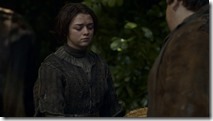 |
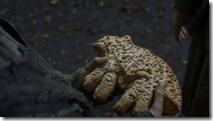 |
 |
I imagine the scene everyone will be talking about is the final one, as Jaime discovers the hard way that constantly raising his father’s name can’t always save him. Jaime is, as I’ve said before, a truly surprising character, in many ways one of the most complicated in the cast despite appearances. He first tries to warn Brienne not to resist when she’s raped when Locke and his party make camp – though he admits if it were he, he’d force his attackers to kill him. When Brienne of course resists, he takes it upon himself to save her from the horror that’s about to befall her, tempting Locke with tales of the immense riches her father will pay if she’s returned intact. Jaime’s reward for his kindness is a cruel one indeed, though fairness has no role in Martin’s world and in any event, karma has a long memory and Jaime has much to answer for. It’s a brutal, terrible and ugly moment – the kind GoT is famous for – and somehow, hearing the rock-out version of “The Bear and the Maiden Fair” just makes it that much worse.
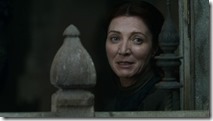 |
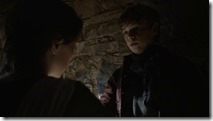 |
 |
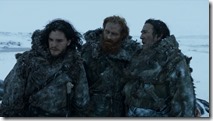 |
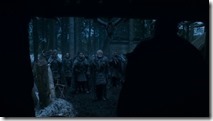 |
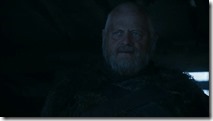 |
 |
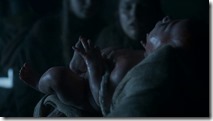 |
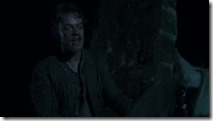 |
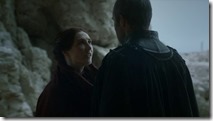 |
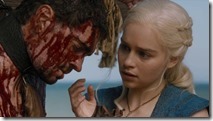 |
 |
 |
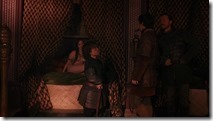 |
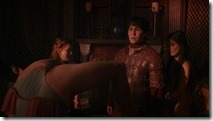 |
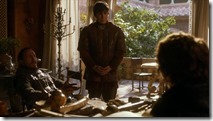 |
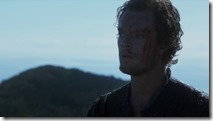 |
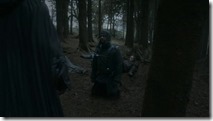 |
 |
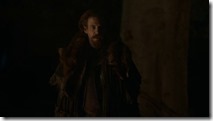 |
 |


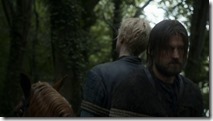


elianthos80
April 15, 2013 at 2:59 pmChecklist format comment:
– That wolf bread. And related rare Arya moe. AWWWW <3
– That chair scene. May your guts and wits live long, Tyrion.
– Stannis so far has been shown as swinging between tightass moralist and lost horny man-child. Plus religious fanatic. Do not want D:. Is he like this in the books? Anyway in terms of hipocricy seems to an even fight with Dany's ruling claims.
– T&A (and gore) weekly quota: filled!
— who's Theon? Look for the miserable one with delectable pale buttocks…
— what's in a Pod? anyway… aren't three ladies overkill for a supposed virgin?
– I was hoping since last week Dany actually understood every word the merchant was saying even without translation. Uh-uh. While I wasn't a fan of her scenes last season – or of her character's evolution in general really – I could stare at Emilia Clarke for hours. Beautiful woman.
Talking of Astaporh I do hope that huge harpy statue is intended as made of gilded wood rather than metal. That building is not gonna bear the weight. Seriously, looking at it made me antsy. It was distracting.
– Catelyn's reflective moments were really involving. Expressive face. She's tripping all my death flags though. And so is Talisa for that matter. The one in the boat is not the only fish who's gonna burn…
– I must second the on-screen 'artistic' comment at the spiral of horses' carcasses(ginga gore!). Damien Hirst in recent years has put much worse stuff in art museums.
– Last but not least: Jamie, that was noble. If you hadn't attempted to kill MAH BRAN and hadn't fathered a monster I'd be definitely cheering for you :,).
admin
April 16, 2013 at 12:23 amStay tuned because I can't answer any of your speculation, but I will say there are some things coming up that should be relevant…
Stannis is pretty close to how he is in the books, yes. In terms of hypocrisy, there are no saints in GoT, true. Based on what the TV audience has been told, I think it's fair to say that Stannis and Dany have the two most legitimate claims to the throne, depending on whether you think Robert's revolution was legit. But then there's a certain blacksmith whose identity the TV series has made quite plain…
Awet M
April 16, 2013 at 3:47 amI think Martin wants us to accept that there are no noble heroes or utterly evil villains in his stories. First he offs the man of integrity to demonstrate how much credit noble virtues have, and then forces the reader to see good in the ostensible villains, like Jamie Lannister, and clay in the feet of the supposedly good guys, like Stannis Baratheon.
Martin would be half the writer otherwise had he stuck to Tolkien's black and white morality from the 1940s.
However, Baratheon was not this much of a hypocrite in the books – he was faithful to his wife and his mentally ill daughter.
elianthos80
April 16, 2013 at 10:12 am@GE and Awet: well, sure Martin is aiming for shades of gray (and black) and I'm fine with that, it's just that I find both Dany and Stannis' element of 'I'm on the side of right and truth and good' Lord of Light's king paladin against eeeeebil (= old gods and throne rivals heathens) + I have dragons I'm a noble soul and I'm the Dragon. matched with the respective means make for a particularly grating well-intentioned extremist dressing in my book compared to the other characters' reasons.
Thanks for the bit about book!Stannis btw. I can see how trimming is needed in the show because of how many characters and plots it features already but his TV counterpart sorta looses points in the adaptation this way.
Speaking of righteous claim to the throne Robb also doesn't look too good (undermining vital alliances to your revenge ad honour and honesty quest via broken engagements because… well hormonal teenage wolf, baby!) going by what ''Talisa''s background was supposed to be in the books.
I'll stay tuned of course.
*waves Gendry flag* so far the lad has done nothing wrong. And in my foolish dreams I'd love for him and Arya to end together, he making swords and she testing those out. Fat chance that's gonna happen but a girl can dream :,)
admin
April 16, 2013 at 1:03 pmAwet, I would love to debate your POV about Stannis vis a vis hypocrisy, but I think it's impossible to do it in a newbie-safe way. So I'll just say that I definitely think book Stannis is a pretty big hypocrite too, and that's not based on anything that hasn't happened by this point in the TV timeline.
Remember, Eli, Talisa isn't in the books. I don't know why they changed the scenario for Robb's marriage from the books – Talisa adds nothing of consequence and the nature of Robb's blunder is much clearer the way Martin wrote it.
elianthos80
April 16, 2013 at 2:14 pm@Enzo: Precisely. I'm partially spoilered on that, that's why I wrote "Talisa" between "" btw ;). From the related bits seems pretty clear (and consistent) Robb is his father's son. But as usual you're much better at getting the point across.
hoiut
April 16, 2013 at 11:08 pmFor an adaptation everyone says is trimming out quite a bit of arguably important detail, it sure likes to spend time adding raunchy bits. Cue the "fanservice" police. I watch the censored version illegally, so I get none of the nibbly bits anyway.
I have no idea how or why anyone here thinks Stanis has one ounce of moral integrity, much less that he is portrayed as the "supposedly good guy." Maybe you've all read the books and read differently into the events, but it almost feels like we've been watching different shows with the way people seem to classify him.
To me from the very beginning, he was seen as a conniving, greedy, merciless force of pure evil. An opportunist eager to turn to evil, black magic, murder (killing his brother with black magic), while at the same time completely and stubbornly stupid. He seems incapable of reason or empathy, and spurns all sound council in favor of a seductress witch's lies. Quick to believe any illusory promise or unlikely scenario that solicits him the iron throne, he even seemed painfully unable to grasp that his forces had lost after his defeat at King's Landing.
Stanis' whole existence is cringe-worthy. I honestly and completely believed that the viewer was supposed to see his corrupted existence as the only silver lining in Ned Stark's death — we were supposed to be deeply relieved that Ned didn't get the chance to award this twisted, demented devil the seven kingdoms!
Where's the nobility in him? "His claim's legit" is true, but obviously not morally right given his person. Was everyone touched by his token manipulative (not to mention dubious) backstory of holding a keep for Robert during the previous rebellion and not getting the reward he thought he deserved? He clearly believes in nothing that doesn't fit his wants, and everything that does. His tongue is forked enough (or his exploits long ago worthy enough) to net a few loyal followers, who he keeps near and obedient with promises, guilt trips, and incessant reminders of his birthright. A personification of an avaricious devil if I've ever seen one — I've yet to see a moral fiber in his body.
If, however, the show is just doing a preposterously miserable job convincing the viewer that he is "simply a well-intentioned but misguided fellow who earnestly seeks his rightful place in the world to save it from the disastrous grip of of the Child King," I am willing to change my mind about him. Slightly.
admin
April 17, 2013 at 12:20 amI really don't want to say much because the ice is getting thin out here, if you know what I mean.
But as to Stannis, here's what I think the TV series is trying to communicate about him – as to how well I'm not the best judge because I have indeed read the books, so I may be injecting some it based on that. Stannis honestly believes what he's doing is right. He's convinced his decisions have the force of the right and just, and is very good at self-deception when his logical side sees the flaws in his reasoning. I think Davos is supposed to act as a sort of conscience for him.
Remember this, too – Davos believes in Stannis, and Davos is one of the few unfailingly decent people in the series (despite his illicit past as a smuggler).
hoiut
April 17, 2013 at 12:24 amI have to compare Stanis to Danyris (Storm-born) Targarian.
Both have been robbed of their birthright. And, to some extent, both have sold their person, their family, and their beliefs for the power to reclaim it. Both are opportunistic and make endless sacrifices to achieve these dubious ends.
The elephant in the room is, of course, hito no kokoro. Whose sacrifices go against their nature, and whose merely reaffirm it? The not-so-subtle distinction between these two players in the game of thrones is that Danyris generally seems genuine and her heart seems (mostly) good. Stanis, on the other hand, has no such gooey center (or if he does, it's the goo of rotten slime).
Consider the following:
– Danyris is initially a piece of chattel to her brother, sold as a bargaining chip to get him an army. Stanis is originally a conqueror who received a seat in Robert's council.
– Danyris comes to love and embrace her captors, adopting their ideals and traditions, granting her a leadership position. Stanis was simply given one as the King's brother and runs away scheming when said king appoints an honorable man (Ned) to be king's hand instead of him (jealousy? cowardice?). Far from Danyris' embracing, loving character, Stanis does the opposite and corrupts the beliefs of his men (black magic Lord of Light nonsense), to the point of eventually butchering the few loyal men in his own company who speak out.
– Danyris and her brother lost the throne because of another family's revolution, and sought to reclaim it. She solidifies her resolve only because the regime tried repeatedly to kill all of her family (and her). Stanis was simply denied the throne by his own family; his brother gave it to his son (despite Ned's efforts). He had the resolve, born solely of avarice, to become king since the beginning.
– Danyris' sacrifices, though numerous, are each individually justifiable to some extent, and represent a girl taking hold of her destiny and making tough moral choices. She freed her Dothraki slaves, but is convinced that buying others ensures them a better life than their former captors in addition to winning her the throne. It also deserves note that Danyris is loyal to her husband even in death, and saved enemies from rape. Stanis has willingly discarded the religion of his fathers (and apparently later allows the witch to force his men to do likewise), his family (brothers), and beds the witch (I thought it was mentioned he has married, too).
– A brother's dominance: Danyris afforded her crazed brother the mercy he never showed throughout his abusive relationship. She refrained from punishing him severely even when he repeatedly broke the rules and disrespected her new people, traditions, and status. Stanis insults the dead Robert and murders his well-loved younger brother with black magic instead of negotiating, joining, or besting him honorably. It is implied that he knows how it happened when the issue is brought up by his closest adviser (who is also locked up — or killed — for a provoked attack on the evil witch).
All we've seen implicates Stanis as a corrupted (bad) man and Danyris as a (fairly) decent girl yet. I still maintain that it would be cool if Stanis did get the throne and plunges the entirety of the realm into darkness.
hoiut
April 17, 2013 at 12:36 amAh, just saw your reply. Interesting… especially the bit about self-deception. That not only helps to explain some of his seemingly illogical decisions, but also speaks to his stubbornness a bit.
Can you answer me the following things? Might really help clarify the situation.
– Is the Lady of Light cult a legitimate religion in this mythos? I was left with the impression it's just the embodiment of a tiny evil cult of black magicians, and had speculated that the witch had completely made it up to control Stanis.
– What was Stanis like before John Aaron was killed? I don't remember them saying much. I gathered in retrospect that he was the same scheming fellow back then, too, trying to use Aaron's influence to gain a footstool for his own. Did he think what he was doing was right even then? Was he actually somewhat virtuous?
– Did Robert really dislike the guy? I know he told us his backstory, which I saw to be filled with simpering self-pity, victimization, and excuses for his current state, as well as an attempt to guilt his follower to remain loyal in spite of the immoral things being done. How much of the backstory told by a seemingly manipulative master of self-delusion is just forked, butt-hurt rambling, and how much was an accurate indication of real hatred on Robert's part? Further, even if such a power-hungry man really was victimized to the extent he seeks to convey, what could be the reason behind Robert's hatred of him, considering that very Robert appointed the series' most honorable man to the position Stanis considered "his by right" (a favorite phrase of the series)?
admin
April 17, 2013 at 3:21 amYou know as much about the Light cult as you're supposed to know, let's put it that way. You've seen what Stannis' old friends think of it, but remember too, it's not a religion native to Westeros.
Since we never met Stannis before Arryn was killed, we only have what other characters said about him to go on. I don't personally get the sense he's changed all that much apart from his religious beliefs.
Awet M
April 18, 2013 at 4:34 amStannis is supposedly incorruptible in the novels, because he is a stickler for the law – hence the birthright claim and the rejection of prostitution at Dragonstone. The only thing that makes him different from Ned Stark is that he lacks charisma.
Daenerys is more of a sympathetic character than a typical heroic protagonist.
On the show Stannis is a hypocrite of the highest order – and Enzo humanizes him with the common flaw of self deception.
admin
April 18, 2013 at 6:10 amStannis in the books is every bit the hypocrite he is in the TV version, and you're kidding yourself if you think otherwise.
Awet M
April 18, 2013 at 4:16 pmEleven if you think your modern morality is objective for all time and applies across historical periods I am right.
Stannis Baratheon is an upright moralizing prig who lacks charisma in the books. Please refresh your memory and check a couple if wiki summaries, since you aren't interested in justifying your contrary assertion.
Maxulous
April 18, 2013 at 11:40 pmStannis presents somewhat of a contradiction in that he's no Godly man, yet is happy to appropriate the the language of R'hollor. He's never shown much devotion to the religion himself, and seems to view it as more a means to a justly end. He's a hard egg to crack because a lot of his influence on events is brought about by other characters whom he projects his expectations onto. He is a man who values his justice and others' loyalty above all else which is why he is drawn to Davos' sense of unfailing duty and Melisandre's devout promises. In the books he seems open to "truths that cut both ways" such as Renly's murder because no bad deed can blot out the good and vise-versa. Staunchly neutral.
The additional TV scenes depicts him as slightly more remorseful of his cold views yet openly confides more in Melisandre's warm promises (after strangling her 4 episodes ago). The series has gone to more length in showing Stannis as hypocritical, desperate and lost. After-all he's meant to be "pure iron, black and hard and strong, yes, but brittle, the way iron gets. He'll break before he bends".
The scenes in this season bother me a little because we actively see a new Stannis who lets Melisandre pulls his strings and effectively strip him of his own principals.
Maxulous
April 19, 2013 at 12:40 am*principles.
hoiut
April 19, 2013 at 8:18 pmVery interesting remarks. What's clearest of all now is that Stannis (I have apparently been spelling it wrong, as with most names in this series, for which I apologize) is a remarkably interesting character. Apparently there's some good depth to the man that is only exacerbated by the mysteries surrounding him, his methods, and his ambitions.
All the more interesting an "upright, moralizing prig" is the only character currently immersed in the dark arts (as far as I can tell). Truly a multifaceted individual.
Awet M
April 27, 2013 at 1:39 amCorrect, which is why the character is a lot more interesting and complex than the show has depicted him so far as a hypocritical pragmatist. Hopefully they'll restore some of that complexity down the road.
admin
April 27, 2013 at 1:47 amhouit, I actually don't think he's as interesting as many other characters, but he's still interesting – Martin is gifted at creating fascinating characters. I've never doubted that Stannis tries very hard to convince himself he's always doing the right thing, or that he believes (not knowing what the TV series viewers already do) that his claim to the throne is legitimate. But I still believe he's fundamentally acting out of an inferiority complex towards Robert that he never got over, and that he knows full well that many of his actions (like murdering his brother in cold blood) are reprehensible and committed in the naked pursuit of the power Stannis feels is rightfully his.
I think this desire to purge his soul is why he has this love-hate relationship with Davos. It has an element of "Believe in the me who believes in you" to it – he likes the fact that Davos never loses sight of the Stannis that Stannis would like to be, if he weren't such a weak man.
Stöt
April 19, 2013 at 6:50 pmEnzo, have you said anything about how the series has too many main characters? The result is that only one thing happens to any character at any time (they all get either 5 or 0 minutes of screen time each episode), which makes for a really bad and somewhat boring series. That's my opinion anyway and the opinion of most people I talk to.
Every book after the first was a disappointment, where the series as a whole just got worse and worse, partly because he introduces too many first-person characters, but I could go on about this forever. It suffices to say that I welcome every change from the book, but the changes are too few, and the show is hurting badly from it.
Anyway, i'm giving the series 2 unhappy Stöts out of six, so far.
admin
April 19, 2013 at 11:40 pmI've mentioned it more times than I can count. It's a much bigger issue for the TV series than in the books.